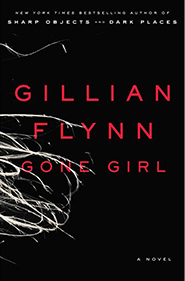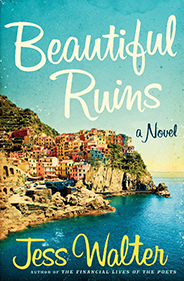by David Abrams
Buy on NOOK »-
March 21, 2013
Quarterfinals
-
Gillian Flynn
1Gone Girl
v.
2Beautiful RuinsJess Walter
-
Judged by
Kate Bolick
There’s a theory that romance novels are popular because their readers are really shrewd time managers, not the mawkish chumps they’re usually taken for. After a long, self-abnegating day of laundry, vacuuming, and errands, Mrs. Bovary puts the lasagna in the oven, looks at her watch, sees she’s got 10 minutes before the kids get home, grabs Desire on Trial off the bedside table (by some miracle that title does not appear on Amazon), and has herself some “me time,” assured that she can put down the book without losing the thread when she picks it up again three days later.
Jess Walter’s Beautiful Ruins and Gillian Flynn’s Gone Girl aren’t romance novels, but they both hinge on love stories and hook the reader with the cliffhangers and unexpected twists associated with genre fiction. And both writers are very clever about weaving meta-critiques of these formulaic techniques into their stories precisely as they’re employing them. Other than that the books have absolutely nothing in common (save for the surprise appearance in each of a faux-Western shirt—a totally insignificant detail, it just seems worth noting that faux-Western shirts are a thing).
I’ll confess here that I’d been avoiding Gone Girl in that way one does when something gets too much adulatory press. The plotline isn’t my kind of thing anyhow: 30-something magazine writers Amy and Nick Dunne leave the “frantic, thrilling futureland of Manhattan” for a rented McMansion in Nick’s hometown on the Mississippi River, and then on their fifth wedding anniversary Amy goes missing. Sounds like a chick-lit potboiler.
Beautiful Ruins seemed more promising. It opens in 1962 in a sleepy Italian coastal village the size of an espresso cup, elegantly depicted in sentences as picturesque as the view, luring you with a hinted-at pathos that promises high literary experience. And then—flash forward—it’s modern times from the point of view of a grouchy assistant film producer whose 72-year-old boss, an industry legend, is so addicted to cosmetic surgery that his face looks “prematurely embalmed,” “glistening, vaguely lifelike.”
Scritch, scratch went my pen, making appreciative checkmarks.
And then it’s the 1960s again. And then you’re reading a World War II veteran’s (very good) unpublished manuscript. And so the story progresses with subtle feints and daring switchbacks, meanwhile unveiling a very convincing critique of Hollywood then and now, until all those seemingly unrelated characters…well, I won’t ruin it. Richard Burton playing himself is a highlight.
Unsurprisingly, Gone Girl is the opposite of subtle, which is to say it hits you over the head. Chapter one: Nick is acting very suspicious. Something very mysterious is going on. There are many more pages to go.
I rolled my eyes.
On page 12, I laughed.
Amy is describing the offerings at a post-holiday get-together in a third-floor Brooklyn walkup: “Some potato-chip shards sit in the bottom of a giant Tupperware bowl. A supermarket deli tray full of hoary carrots and gnarled celery and a semeny dip.”
I was like, Sister, I think I was at that party.
Then I was like, Huh. What is this book?
There are the spot-on depictions of the politics of adult friendship (“Carmen, a newish friend—semi-friend, barely friend, the kind of friend you can’t cancel on”), the sensitive insights into the indignities of being an unemployed writer during this recession, lots of jokes: “Americans like what is easy, and it’s easy to like pregnant women—they’re like ducklings or bunnies or dogs. Still, it baffles me that these self-righteous, self-enthralled waddlers get such special treatment. As if it’s so hard to spread your legs and let a man ejaculate between them.” (Spoiler: Not all the jokes involve sperm.)
And then—I wish I could pinpoint the moment this happened—the book hijacked my life! Oh the tension, oh the dread. My pulse quickens just remembering the merciless suspense! I read nonstop, guiltily avoiding other deadlines. My stomach felt queasy. I was reminded of the distinct sensation that is getting involved with a guy who tells you up front he’s not looking for anything serious and then confuses you by being really serious in such a way that you want the manipulation to last forever. As a friend, writer Amanda Fortini, recently tweeted, “Gone Girl should come with a warning label: ‘Abandon work and sleep all ye who enter here.’”
And yet: Just because a book makes your heart speed up and ultimately culminates in a totally shocking denouement doesn’t mean that it’s great.
For a book to be great it has to have ideas. Beautiful Ruins gracefully addresses love and longing, ambition and self-delusion, time’s ravages—but these aren’t ideas so much as ruminations. Gone Girl, most unexpectedly, delivers a critique of our unquestioned ideas about love in a way that’s so inventive you don’t even know it’s happened until you reach the end. And then you realize there were hints all along. Like the time Amy muses to herself, “I was told love should be unconditional. That’s the rule, everyone says so. But if love has no boundaries, no limits, no conditions, why should anyone try to do the right thing ever?” When she remembers the moment she fell for Nick, it’s like a thought bubble emanating from a New York Times “Vows” column: “All of a sudden you see reading in bed and waffles on Sunday and laughing at nothing and his mouth on yours…You think: Oh, here is the rest of my life. It’s finally arrived.” And then: Hah! The joke is on Amy! And also on Nick. And also on you.
Why can feeling bad feel so good?
Match Commentary
By Kevin Guilfoile & John Warner
John: I am frustrated by our convention of refraining from revealing spoilers in either the judgments or the commentary. Make no mistake, I agree with this. One of the consistent responses from our readers is that often, the judgments/commentary/commentariat discussion causes them to pick up a book they otherwise might not, and I’d hate to blow that.
But it’s tough to really dig into Gone Girl without an express trip to spoiler-land. As Judge Bolick says, for the right reader (and they appear to be legion) Gone Girl can “hijack” your life.
It does this thanks to a structure and plot that demands you keep reading. Sure, Flynn employs a full bag of the suspense novelist’s tricks, most notably, the sudden discovery at the end of a chapter that forces you to turn the page, but what tricks they are!
I am going to disagree with this from Judge Bolick, though. “And yet: Just because a book makes your heart speed up and ultimately culminates in a totally shocking denouement doesn’t mean that it’s great.”
Sure it does. Or at least it means it’s great at something, which for me is often enough. The books that are great at everything are rare to illusory.
So because I can’t talk about the plot with anything beyond “you’ve got to read it for yourself” acuity, I figured I’d bring up the fact that this is a successful book despite the characters being almost wholly “unlikeable.”
I have no issue with unlikeable characters. In fact, sometimes I think I prefer my characters unlikeable, but Gone Girl is the best-selling novel of the year that didn’t start as Twilight fan fiction. It was optioned by Reese Witherspoon. It is probably the best-selling book in the Tournament since The Help in 2010. The Help became the word-of-mouth book of the half-decade because people loved the characters, Skeeter’s spunk, Aibileen’s spunk, Minnie’s spunk. These heroes had a clear villain (Miss Hilly), and there was pleasure to be had in seeing the triumph of good hearts over bad. When Milly eats her shit pie, we cheer. The Help makes readers feel better about the world.
Gone Girl does no such thing. When the plot turns in Gone Girl, we more likely gasp. It defies all kinds of hoary truisms of publishing with these unlikable characters. Is it an artifact of our time? Has Gillian Flynn proved that the rules don’t apply?
Or is it just that the rules don’t apply to writers like Gillian Flynn.
Kevin: Of course, you’ve been caught in your own trap because just making the claim that Gone Girl has no likable characters is, itself, a spoiler.
John: Rats! Foiled!
Kevin: I don’t think a person who has only read to chapter five would necessarily think there are no likable characters here. The great trick of Gone Girl is that Gillian gets you invested in these people and then she has them turn on you. I don’t want to make too much of the comparison, but it’s a little like what Vince Gilligan has accomplished on Breaking Bad. At the start of that series you had a bunch of extremely sympathetic characters. They were your TV friends. Over the course of five seasons your friends have become liars and drug dealers and cold-blooded murderers. But it happens so slowly, and so logically, you find yourself forgiving each successive transgression until one day you realize that these people you like are evil. You’ve become complicit because you hadn’t made that judgment earlier.
Of course, Breaking Bad has had many, many hours, years even, to allow that transformation to take place. Gillian Flynn has only 300 pages or so (and I won’t say why, but the transformation of her characters, as the reader perceives it, is very different). Still it’s an impressive piece of craft.
I just started a book called The People in the Trees by Hanya Yanagihara, a debut novel that comes out later this year. The protagonist is a Nobel-winning scientist who, when the novel opens, is in prison for raping his own adopted children. Now that is a ballsy place for an author to start her readers.
John: I’m sad to see Beautiful Ruins go. I read it the week of its release, almost a year ago, and so I’ve been paging through it again remembering how wonderfully sentimental it is.
Some say sappy. Maybe so. Maybe I’m a sap.
Sure, it’s funny, but the heart in this book is large and accommodating, which in some ways, at least in the “literary fiction” world, feels like a risk at the level of populating your books with unlikable characters. Sentiment is sometimes viewed as cheap, or unworthy in these circles, but in the words of another sentimental character, “I like it. I like it a lot.”
I was surprised by how many of our readers expressed a certain amount of “meh” toward this book in the comments. I remember getting a little misty as the plot strands and people came together, everyone damaged, but alive. It’s a deeply hopeful book.
In Gone Girl, one’s sins are what we have to live with. In Beautiful Ruins, one’s sins can be absolved by living.
Kevin: I guess we started this discussion with our take on John Green, but sentiment doesn’t bother me the way it used to. I’m sure that’s part of growing old, and I don’t think it’s a bad thing. Upbeat endings haven’t found their way into my own work yet, and my tastes still run to the dark side, generally, but I find myself admiring books that make me feel good more than I used to even a few years ago. Maybe for that reason, I too thought Beautiful Ruins was one of the easiest books on this list for a reader to like. The writing is lovely, it’s funny, the characters are easy to be with. And yet it doesn’t feel slight to me either.
I’m sympathetic to some of the specific criticisms of the novel—as one of the commenters pointed out last round, for instance, Shane is a terrific character who is given a lot of wind up at the start and then not very much to do after—but shit, writing novels is hard. As you say, as a reader you never get to have everything. In Beautiful Ruins I felt like I got way more than my share of joy.
OK, tomorrow Bring Up the Bodies takes on How Should a Person Be?, two more opposite kinds of books on this list you will not find, Building Stories or no. As for the Zombie Round, Beautiful Ruins strikes me as a book that could easily make a comeback and so I’m pulling up the voting results and—oh my! Jess Walter comes within a breath of overtaking Lauren Groff, but he can’t quite do it. If the Zombie Round were held today, our undead duo would still be Arcadia and The Fault in Our Stars.
























